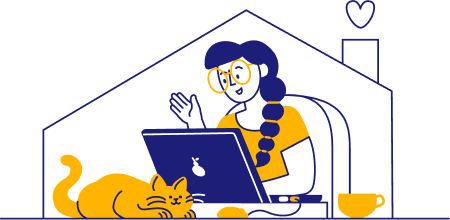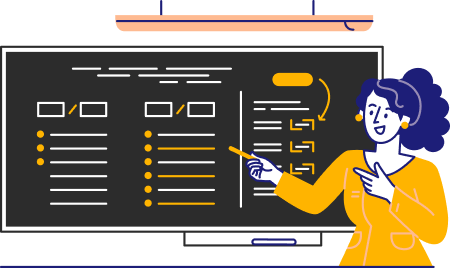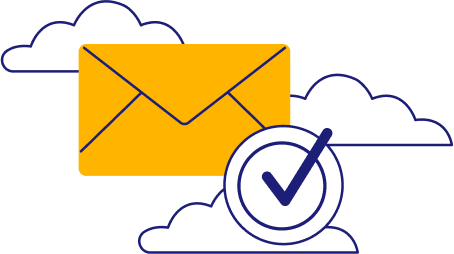You’ve written a stellar cover letter with an attention-grabbing introduction and body paragraphs detailing relevant skills and experiences based on the position’s needs. That said, how do you end it to make a lasting positive impression on hiring managers?
We’re here to help you succeed, from cover letter templates that’ll help you structure yours successfully to expert insights on the hiring process.
We’ll detail everything you should know about how to end a cover letter in this article, including:
• A step-by-step process for crafting your closing paragraph
• How to optimize your cover letter’s sign-off
• Real-world examples that have worked in different industries
Read on to learn the essentials of ending a cover letter successfully.
Crafting the Perfect Cover Letter Closing Paragraph

When you want to learn how to close a cover letter, there’s some essential information that every closing paragraph should contain. Let’s review each element with tips on integrating them successfully to wow the hiring manager as they finish reading your letter.

Summarize your qualifications
As you progress through your cover letter, each paragraph will include key skills and qualifications you’re trying to emphasize based on the company’s needs, detailed in the job description. It’s similar to selecting the right resume skills.
At the end of your cover letter, you should reinforce the abilities you included to remind the hiring manager exactly why you’re qualified for the role.
You don’t have to go into too much detail here since you already did so in the other paragraphs. Just a concise sentence or two rephrasing those details will work well. Here are a couple of examples of how to phrase that sentence:
- I’m eager to use my skills in Photoshop and Illustrator as a graphic designer to create imagery that represents your high-tech services at Georgia IT.
- Thank you for considering me for your customer care position at American Family Insurance, where I’m confident my phone etiquette and email correspondence abilities will help me flourish as a helpful advocate for your customers.

Express enthusiasm for the role
Employers want to hire applicants who are passionate about the company’s mission and the tasks they’ll perform in the role. This will showcase how you’ll work hard to be successful once you’re hired and fit in well with the company’s culture. It’s similar to why hiring managers might ask you, “Why do you want to work here?” during the interview.
There are several ways you can express this enthusiasm, such as:
- Mention skills you’re excited to use. Maybe you just graduated with an IT degree and are eager to apply your troubleshooting and networking abilities in a supportive team environment.
- Reinforce why you’re passionate about the company’s mission. For instance, if you’re passionate about a company’s mission for environmentally friendly solutions, you could include how you’re motivated to work with a team that shares your values.
- Discuss enthusiasm about the company’s culture. They might strive for an innovative and solution-focused atmosphere, and you could write about how you’ve used new technology to find unique solutions to everyday problems.

A call to action
Another good strategy for showing your enthusiasm about the role while encouraging hiring managers to consider including you in the next steps of the hiring process is a call to action.
It’s a good idea to keep this light, as being overly assertive could come across as unprofessional. A good example of how to do this would be:
“I’m looking forward to discussing further how I can use my strategic knowledge to help you create an industry-leading client experience as a senior account manager.”
Try to tailor the call to action for each job, such as mentioning the company’s goals or the exact job title you’re applying to. Remaining specific to the company’s needs will help reinforce your desire to take the next steps.

Thanking the reader
To reinforce your professionalism, it’s always best to thank the hiring manager for their time and show gratitude that they’re considering you for the position.
It’s also what you’d do on the job when communicating with customers, clients, or co-workers, so it’ll help you represent how you work well in professional settings where polite correspondence and dialogue are essential to success.
A good way to structure this would be saying something like:
“Thank you for considering me for the accounting internship at ASM Global, where I’m confident this will be an excellent opportunity to continue growing my tax prep and payroll management capabilities with your detail-oriented finance team.”
Always tailor this to the specifics of each job so you can showcase genuine gratitude for the opportunity a company is offering.
How to Sign Off on Your Cover Letter

Similar to the closing paragraph, how you sign off your cover letter will help with the final impression you make on a hiring manager. You’ll want to select a sign-off that shows professionalism and is appropriate for a formal cover letter. Let’s review the best sign-offs for cover letters, mistakes to avoid, and whether it’s still appropriate to include a handwritten signature.

Professional sign-offs
In general, the safest choice is to end with “sincerely.” This time-tested option hasn’t gone out of style since it shows respect to the person reading your letter.
Saying “thank you” is also a safe choice since it reinforces the gratitude you expressed in your closing paragraph and your appreciation for the hiring manager taking the time to review your qualifications.
Otherwise, “best regards” is another formal alternative that works well. You also have variations of this one, such as just saying “best” or “regards.” That said, the shortened versions are better suited for short cover letters in emails where you can be a little less formal.

Common sign-off mistakes to avoid
The most common mistake when choosing a sign-off for cover letters is using options that don’t sound as professional or may come with negative associations. For instance, while a sign-off like “cheers” can feel fun and lighthearted, it isn’t as appropriate for formal or professional correspondence due to its association with drinking.
Some other sign-offs that can sound a bit too informal are:
- Take it easy
- Catch you later
- Have a good one
These options are better served for more casual conversations than in professional cover letters.
Another common mistake when signing off your cover letter is not including your full name. Writing out your first and last name reinforces who you are, so hiring managers remember you after they’re done reading. It also looks more formal and professional than just including your first name at the end.

The importance of your signature
Since many applications are completed online and cover letters are submitted virtually, most companies won’t require you to add a handwritten signature at the end of your letter. So, unless otherwise specified in the application instructions, it’s acceptable to skip this step in most cases.
That said, adding a handwritten signature can be a nice extra touch to show you took the time to create a well-rounded cover letter. Once your cover letter is complete, you only need a printer with a scanner to print it out, sign it, and scan and upload it back onto your computer. Then, you can submit it as you would normally during the online application process.
Adding any extra details, like customizing your cover letter with unique details for each position you apply to or adding a handwritten signature, does add up when hiring managers review applications. Those added elements show you’re willing to go the extra mile on the job to get things done right, so don’t be afraid to include them to stand out.
Examples of Effective Cover Letter Closings

Now, let’s combine all the elements with some cover letter conclusion examples. How you structure yours can vary depending on skills and qualifications for different industries, so we’ll provide several options to help you tailor your closing paragraph successfully for different careers.
Example for a Creative Position
- Thank you for considering me for the graphic design role with your collaborative team at Urban Outfitters. I’m excited about the opportunity to use my abilities in airbrushing, exposure adjustments, and motion design within the Adobe Creative Suite to make your ads in digital and print media stand out. I look forward to discussing further how I can use my design and strategy skills to help you better connect with consumers in diverse markets.
Thank you,
Rafael Silva
Example for a Technical Position
- With my deep desire to help others, I’m confident that Motorola Security will be an excellent opportunity to use my abilities in NOC systems and network administration as a network operations technician. I’m certain I’ll be able to help your analytical team develop new strategies to help achieve your goal of making people feel safe and secure in their homes when they have a security system installed. Thank you for considering me for the opportunity to work on your security network’s ecosystem. I’m eager to discuss further how I can help maintain the highest level of service for your customers.
Sincerely,
Rachel Daniels
Example for an Executive Role
- Your mission to achieve the highest levels of academic integrity at the University of Wisconsin Stevens Point is why I know this position will be the ideal fit for my skill set. I’m excited to discuss further how I can lead teams while conducting surveys and deploying business intelligence systems to improve your grant approval process. Thank you for considering me for your Chief Data Officer role, where I know I can enhance processes while overseeing data-driven teams to benefit the next generation of students.
Sincerely,
David Castellanos
Example for a Customer Service Job
- My desire to provide fast and reliable service will make me a terrific fit with your customer-focused service team at VCA Animal Hospital. I’m confident I can uphold your mission of providing exceptional service to people and their pets while operating multi-line phone systems and using solution-focused problem-solving during emergency care situations. Thank you for considering me for your customer service representative role, where I could work for a caring organization I believe in. I’m eager to discuss further how I could make an impact managing phone calls and assisting customers as part of your customer service team.
Thank you,
Marisa Thompson
Example for a Marketing Job
- I’m thrilled about the opportunity to lead your marketing team at UMB Bank as you work toward deploying and promoting new virtual service options that will better assist your customers. I’m confident my market segmentation, trend analysis, and creative briefing abilities will make me an asset in that process as your marketing manager. Thank you for your time as you look to expand what is possible in commercial banking solutions. I look forward to discussing in more detail how I can help boost your promotional performance and connect with your customer’s needs during your upcoming marketing campaigns.
Sincerely,
Robert Marchand
Example for a Finance Position
- I believe my well-versed experiences in financial management and cloud data systems will make me an excellent fit at Stride. As your next cloud financial analyst, I’m confident I could use my skills in CloudZero, financial forecasting, and cost analysis to help you optimize performance as you continue building better-performing virtual education solutions. Thank you for considering me for your innovative financial team. I’m eager to discuss further how I can help you harness the latest technology to elevate business performance.
Sincerely,
Lyria Ashford
Example for a Healthcare Job
- My passion for helping patients feel confident and safe during hospital visits is why I pursued nursing and why I know Ascension will be a great fit as I begin my career. Thank you for reviewing my qualifications for your student nurse intern role as you continue to grow your patient-focused medical team. I hope to discuss further how I can use the medical analysis and diagnostic service skills I’ve developed in school to provide an outstanding experience for every patient I work with while continuing to learn and grow as part of your team.
Thank you,
Kendra Foster
Example for a Retail Job
- Thank you for considering me for your merchandiser role at TJ Maxx, where I could positively impact the in-store shopping experience. I’m eager to apply my skills in floor plans, display building, and customer service to create an exceptional experience for every guest who walks through the door. I look forward to discussing further how I can make an impact as part of your organized merchandising team as you prepare for the busy holiday season.
Sincerely,
Nathan Wells
Example for a Hospitality Role
- I’m eager to apply my customer service and problem-solving skills as a front desk agent at the Sheraton Suites. I’m confident I could manage POS systems, organize room service, and help with room selection to ensure a relaxing stay for every guest. Thank you for considering me for your upscale hotel service team that goes above and beyond for your customers. I hope to discuss further how I can use efficient and accurate service to help you achieve the highest-rated hotel experience in the Philadelphia metropolitan area.
Thank you,
Darnell Jenkins
Key Takeaways for Ending Your Cover Letter

Now that we’ve reviewed some effective cover letter ending examples, let’s sum up everything you should remember as you begin to craft an effective closing for yours.

Recap of best practices
The best practices for an impactful ending to your cover letter are:
- Restate your connection to the company’s mission and the top skills you bring to the table. This will reinforce exactly why you’re equipped to handle the job’s tasks and are a good match with the company’s culture.
- Thank the hiring manager for their time and considering you for the role. It’s a polite gesture that will showcase your professionalism.
- Use a call to action to show continued interest in taking the next steps in the hiring process and get the hiring manager thinking about bringing you in for an interview.
- Show enthusiasm about the company and role. Talk about skills you’re excited to use, goals you want to help the company achieve, or why you’re passionate about their mission.
- Use a professional sign-off at the end. Either “thank you” or “sincerely” are safe choices for cover letters.
When you’re struggling with the structure of your cover letter, you can also use a cover letter generator or cover letter templates to help guide you in the process.

What not to include in a cover letter closing
Some things you shouldn’t include while closing your cover letter are:
- Don’t add too many details that make your closing paragraph too long. You’ve already included great examples of using your top skills in the workplace in your body paragraphs. Simply rephrasing those already excellent details in three to five sentences will be enough.
- Don’t include a sign-off that might seem unprofessional. Options like “cheers” or “take it easy” can sound fun and lighthearted but might be taken the wrong way in a formal cover letter.
- Avoid demands or pushy language in your call to action. Saying something like “I expect to hear back from you next week” might get taken the wrong way by a hiring manager. Instead, keep your call to action light and formal, such as, “I’m eager to discuss this position with you further.”

Final checklist before sending
Once you’ve crafted an impactful ending, make sure you review your entire cover letter before submitting it. Here’s a quick checklist to ensure yours has everything it needs.
- Did you proofread for grammatical errors and accuracy?
- Does it reference three to five top skills throughout that are relevant to the job description?
- Did you connect to the company’s mission?
- Is your contact information clearly stated toward the top?
- Is your full name and job title clear and present?
- Did you thank the hiring manager and show gratitude?
- Did you use professional language throughout?
- Did you clearly state the company’s name and the job title you’re applying for?
- Are your paragraphs concise and organized, showcasing relevant experiences?
- Did you use a professional sign-off with your full name?
If you’ve checked off all these elements, it’s a good sign that your cover letter is ready and prepared for success.
Ending a Cover Letter FAQs

In most cases, a closing paragraph of 70 to 120 words will be ideal. This will ensure you include all the essential details, like restating your top skills and connection to the company’s mission, thanking the hiring manager, and showing enthusiasm while keeping it concise for easy review.
You should always include a call to action in your cover letter’s conclusion. It reinforces your interest in the next steps of the hiring process and gets the hiring manager thinking about interviewing you. Digital marketing statistics show that personalized CTAs boost response rates by 202%. Likewise, a solid CTA will provide a boost in the hiring process.
Generally, it’s best to keep your cover letter’s sign-off formal and professional, no matter your industry. “Sincerely” or “thank you” are both safe choices. Even in short email cover letters where communication can be a little less formal, you want to go with more professional sign-offs when first introducing yourself.
The best examples of professional sign-offs are “sincerely,” “thank you,” and “best regards.” These are all safe choices for formal communication and cover letters. Choosing one of these options will help you reinforce your professionalism during the hiring process.
Personalizing the closing of your cover letter is essential to make each job application you submit stand out. Hiring managers respond much better to cover letters that are customized to job-specific needs, reference the company’s mission, and show passion for what they’re doing. It shows you did your research and how you’ll fit in with the company’s culture.
The most common mistake to avoid when closing a cover letter is making your closing statement overly generic. Even if you have a great template, don’t just copy and paste it for every job. Instead, make it specific to each job description so it’ll stand out and connect when hiring managers review it.





